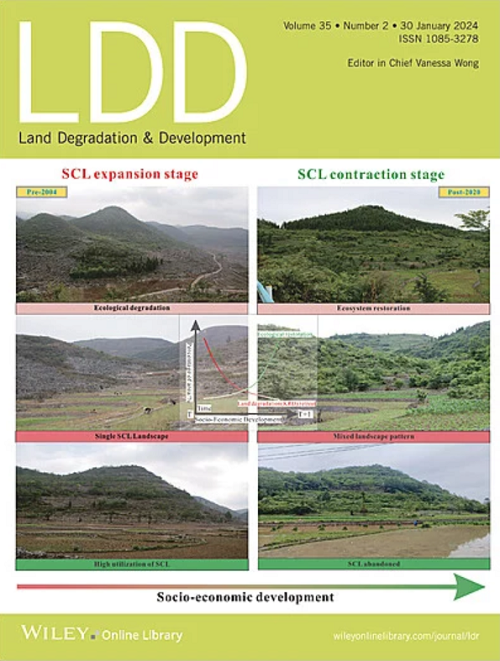A Forgotten Corner: An Ecological Game Land of Resource Abundance and Escalating Conflicts
IF 3.7
2区 农林科学
Q2 ENVIRONMENTAL SCIENCES
引用次数: 0
Abstract
The balance between resource development and ecological conservation is a fundamental challenge in achieving sustainable development, particularly in regions where human activities have a significant impact on ecosystems. This study presents a case of ecological and socio‐economic consequences of oil extraction in the Chinese Loess Plateau. Findings indicate that, although oil development has stimulated local economic growth, it has simultaneously caused ecological degradation, including habitat fragmentation and biodiversity loss. Specifically, within the oilfields, all three plant strata—tree, shrub, and herb layers—show reduced species diversity and richness. Shannon indices are 0.61, 0.53, and 1.86 in the oilfields, compared to 0.65, 1.25, and 2.05 outside. Despite the economic benefits, oil extraction has exacerbated human‐wildlife conflicts (HWC), complicating socio‐ecological dynamics. Key trade‐offs between ecosystem and the intensifying human‐wildlife conflicts have been identified, creating a vicious cycle that threatens both environmental sustainability and community livelihoods. By analysing plant diversity, ecosystem characteristics, and records of human‐wildlife conflict (HWC) across different land‐use zones (core conservation areas, ecological transition zones, and human‐dominated areas), this study reveals that the ecological transition zone (ETZ) is particularly vulnerable to the combined pressures of resource exploitation and biodiversity conservation. The study further emphasises the necessity of integrated management strategies that incorporate ecological restoration, community engagement, and policy reform. Results highlight the importance of maintaining ecological resilience and developing adaptive management frameworks that balance development with ecological sustainability. The findings offer valuable insights for managing resource‐dependent regions globally, providing a model for reconciling economic development with environmental stewardship.被遗忘的角落:资源丰富与冲突升级的生态博弈之地
资源开发和生态保护之间的平衡是实现可持续发展的根本挑战,特别是在人类活动对生态系统有重大影响的区域。本文介绍了中国黄土高原石油开采的生态和社会经济后果。研究结果表明,尽管石油开发促进了当地经济增长,但同时也造成了生态退化,包括栖息地破碎化和生物多样性丧失。具体而言,在油田内,所有三个植物层(乔木层、灌木层和草本层)的物种多样性和丰富度都有所下降。油田内的香农指数分别为0.61、0.53和1.86,而油田外的香农指数分别为0.65、1.25和2.05。尽管有经济效益,但石油开采加剧了人类与野生动物的冲突,使社会生态动态复杂化。生态系统与日益加剧的人类与野生动物冲突之间的关键权衡已经确定,形成了一个威胁环境可持续性和社区生计的恶性循环。通过对不同土地利用区(核心保护区、生态过渡区和人类主导区)植物多样性、生态系统特征和人-野生动物冲突(HWC)记录的分析,表明生态过渡区(ETZ)特别容易受到资源开发和生物多样性保护的双重压力。该研究进一步强调了综合管理战略的必要性,包括生态恢复、社区参与和政策改革。研究结果强调了保持生态弹性和发展适应性管理框架以平衡发展与生态可持续性的重要性。研究结果为全球资源依赖型地区的管理提供了有价值的见解,为协调经济发展与环境管理提供了一个模型。
本文章由计算机程序翻译,如有差异,请以英文原文为准。
求助全文
约1分钟内获得全文
求助全文
来源期刊

Land Degradation & Development
农林科学-环境科学
CiteScore
7.70
自引率
8.50%
发文量
379
审稿时长
5.5 months
期刊介绍:
Land Degradation & Development is an international journal which seeks to promote rational study of the recognition, monitoring, control and rehabilitation of degradation in terrestrial environments. The journal focuses on:
- what land degradation is;
- what causes land degradation;
- the impacts of land degradation
- the scale of land degradation;
- the history, current status or future trends of land degradation;
- avoidance, mitigation and control of land degradation;
- remedial actions to rehabilitate or restore degraded land;
- sustainable land management.
 求助内容:
求助内容: 应助结果提醒方式:
应助结果提醒方式:


